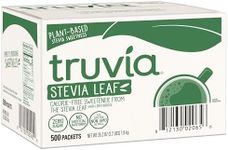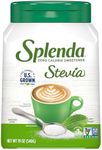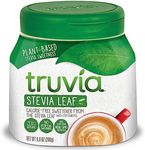Buying Guide for the Best Artificial Sweeteners
Choosing the right artificial sweetener can be a bit overwhelming given the variety of options available. The key is to understand your specific needs and preferences, as well as any health considerations you might have. Artificial sweeteners are used as a substitute for sugar to reduce calorie intake, manage blood sugar levels, or avoid the negative effects of sugar. Here are some key specifications to consider when selecting an artificial sweetener.Sweetness LevelSweetness level refers to how sweet the artificial sweetener is compared to regular sugar. This is important because it affects how much of the sweetener you need to use. Some sweeteners are much sweeter than sugar, meaning you need less to achieve the same level of sweetness. For example, some sweeteners are 200-700 times sweeter than sugar. If you prefer a taste closer to sugar, you might choose a sweetener with a lower sweetness level. If you want to use less product, a higher sweetness level might be more suitable.
Caloric ContentCaloric content indicates the number of calories provided by the sweetener. This is crucial for those looking to reduce calorie intake for weight management or health reasons. Most artificial sweeteners are low-calorie or zero-calorie. If you are on a calorie-restricted diet, choosing a zero-calorie sweetener can help you enjoy sweet flavors without adding extra calories.
Glycemic IndexThe glycemic index (GI) measures how a sweetener affects blood sugar levels. This is particularly important for people with diabetes or those monitoring their blood sugar. Sweeteners with a low GI have minimal impact on blood sugar levels. If you need to manage your blood sugar, look for sweeteners with a low or zero GI.
AftertasteAftertaste refers to the lingering taste left in your mouth after consuming the sweetener. Some artificial sweeteners have a noticeable aftertaste that some people find unpleasant. If you are sensitive to aftertastes, you might want to try different sweeteners to find one that you enjoy. Reading reviews and trying small quantities can help you identify a sweetener with a pleasant taste.
Heat StabilityHeat stability indicates whether the sweetener maintains its sweetness when exposed to high temperatures, such as during cooking or baking. This is important if you plan to use the sweetener in recipes that require heat. Some sweeteners lose their sweetness or develop a bitter taste when heated. If you enjoy baking or cooking, choose a sweetener that is heat-stable.
Natural vs. SyntheticArtificial sweeteners can be either natural or synthetic. Natural sweeteners are derived from natural sources, while synthetic sweeteners are created through chemical processes. Some people prefer natural sweeteners due to concerns about synthetic ingredients. If you prefer a more natural product, look for sweeteners labeled as natural. However, both types can be safe and effective, so it ultimately depends on your personal preference.
Allergies and SensitivitiesSome people may have allergies or sensitivities to certain artificial sweeteners. It's important to read labels and be aware of any ingredients that might cause a reaction. If you have known allergies or sensitivities, choose a sweetener that is free from those specific ingredients. Consulting with a healthcare provider can also help you make a safe choice.



















